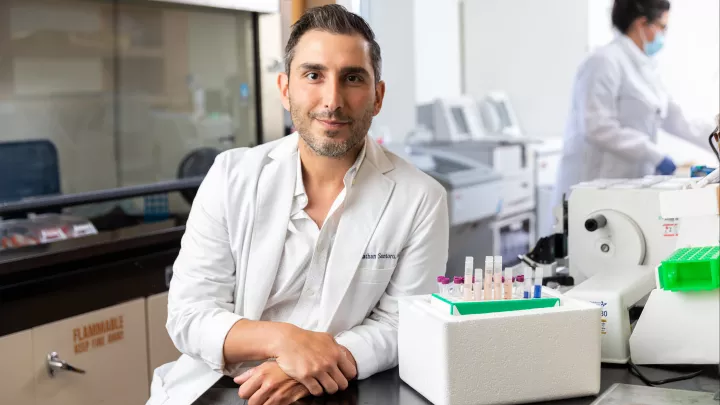Neuroimmunology and Neuroinflammation Treatments
With neuroimmunologic disorders, the brain activates the immune system to attack an infection that is not there. These conditions can cause symptoms like fatigue and memory issues that can be difficult to cope with. But better days are ahead when you come to Children’s Hospital Los Angeles.
Our team includes one of the nation’s foremost experts in pediatric neuroimmunology. We offer today’s best available treatments. Our leadership in research is uncovering promising new options, some of which you’ll only find at our program.
Treatment for Neuroimmunologic and Neuroinflammation Disorders
Neuroimmunologic and neuroinflammation treatments at Children’s Hospital are available in our Pediatric Neuroimmunology and Demyelinating Disorders Clinic or Infusion Center. Your child benefits from a level of expertise that’s not available elsewhere on the West Coast. Our multidisciplinary approach means your child benefits from the recommendations of leading experts in neuroimmunologic disorders and rare diseases.
Experts at Children’s Hospital are also advancing neuroimmunologic and neuroinflammation treatment through research. We offer clinical trials that are only available through our program. National Institutes of Health-funded research gives your child access to leading-edge treatments before they become the standard of care. We also collaborate with Race to Erase MS, the Thrasher Foundation and the National MS Society to bring these research opportunities to our patients.
Treatments We Offer
Children’s Hospital offers a broad range of neuroimmunologic and neuroinflammation disorder treatments. We also have the capabilities to help your child start healing as quickly as possible. This is why children with severe symptoms are eligible to start treatment on the same day as their clinic visit.
Your child’s care may include:
Intravenous (IV) medication
Children with neuroinflammatory disorders often benefit from IV medication. Using an IV enables us to give a higher dose of medication for more efficient care.
- We may use IV steroids, such as methylprednisolone, to decrease inflammation.
- Many children benefit from intravenous immune globulin (IVIG). This solution of antibodies helps your child fight infection more efficiently.
Additional IV medications available at Children’s Hospital include:
- Rituximab
- Ocrelizumab
- Natalizumab
- Cyclophosphamide
- Tocilizumab and other biologic medications
Oral medication
This includes mediations that need to be monitored while they are given, such as fingolimod.
Plasmapheresis
Plasmapheresis removes substances like antibodies from blood plasma. With neuroimmunologic disorders, the plasma carries a type of antibody that triggers attacks on healthy tissue. Plasmapheresis removes these antibodies from the blood, enabling your child to heal. Our in-house Infusion Center administers both inpatient and outpatient plasmapheresis.
Here’s how it works:
- A tube draws blood from the body and into a machine.
- The machine removes plasma from the blood.
- Plasma containing the abnormal antibodies is isolated.
- Healthy plasma then travels through a second tube back into the body.
- It may take several plasmapheresis sessions to achieve optimal results.
Rehabilitative services
These services lessen the impact of neuroimmunologic disorders on your child’s life and maximize their abilities. Children’s Hospital offers a broad range of Rehabilitation Services, including:
Additional services we offer
- Academic support: Our neuropsychologists support your child’s academic success. If their diagnosis may affect learning skills, we develop specialized plans to help them achieve their goals. Our hope is that all patients who wish to go to college can do so.
- Sexual and reproductive health: Neuroimmunologic disorder treatments can affect your child’s ability to someday start a family of their own. Our team provides education on reproductive health and fertility preservation options when appropriate.
- Transition to adult care: As your child approaches adulthood, we ensure a successful transition of care to an adult neurologist. Our pediatric neuroimmunologist attends your child’s first appointment with their adult neurologist to discuss ongoing medical needs.


